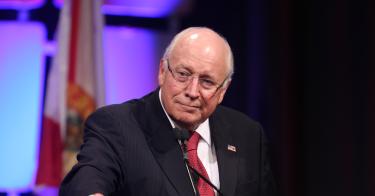Former Vice President Richard Cheney and current Vice President Mike Pence had an argument last week. It revolved around a major theme in the Trump administration’s foreign policy: that U.S. allies should pay more of the costs of the American security guarantee.
According to The Washington Post, the argument — at a retreat in Georgia — saw Cheney express concerns that “we’re getting into a situation when our friends and allies around the world that we depend upon are going to lack confidence in us.”
Cheney worried that Donald Trump acts more like Barack Obama — as a skeptic about America’s world role — than Ronald Reagan. And he worries that the Trump administration is “looking eagerly to find ways where somebody else will pick up the tab.” For his part, Pence pushed back politely but firmly, arguing that it’s wrong to “conflate the demand that our allies live up to their word and their commitments [with] an erosion in our commitment to the post-World War II order.”
This is a serious debate. It is serious in that it’s about important issues, and serious in that both men made good points. We could do with more of this in the United States. Politicians often prefer to debate straw men because the straw man always loses.
I did smile reading about Cheney’s concern over what U.S. allies think of the conduct of a U.S. administration. After all, the George W. Bush administration wasn’t shy about doing things that U.S. allies disliked.
But Cheney made an important point. He rightly argues that the Trump administration believes U.S. allies are too keen to trade security for money. Yet the administration doesn’t want to diminish allies. It wants them to do more — and to pay more.
It wants our European allies to stop trading with Iran, because the trade facilitates Iran’s drive for control in the Middle East. It wants NATO’s European members to contribute what they’ve pledged. It wants the Germans to stop building gas pipelines with Russia. It wants the European Union to stop taking Chinese investment without asking tough questions.
It’s often said that U.S. diplomacy is shaped by its pursuit of the almighty dollar. But in fact, the United States is one of the few countries willing to lose a buck for the sake of its broader foreign policy and security objectives. After all, we could be trading with Iran ourselves.
Cheney’s point that it’s unseemly to look like a New York property developer asking who’s will pick up the tab is well taken. Nor can allied contributions be measured merely in dollars. Armies, diplomats, and much more matter, too.
But at some point, security costs. At that point, defense is more important than opulence.
The administration is right that money matters. But its approach makes sense only when security is genuinely at stake. Unfortunately, Trump has employed the phony excuse of national security to justify imposing tariffs on U.S. steel imports from Europe. That means American consumers pay the price for more expensive steel.
And it’s not just steel. The administration regards the trade surpluses of nations like Germany not as the result of the free decisions of Americans to buy and sell as they wish, but as just another way that U.S. allies free-ride on us. But free trade is not free-riding.
The U.S. can’t defend the post-World War II system alone. And it can’t defend that system if allied governments buy telecom equipment from China and natural gas from Russia.
But the post-1945 system built security through prosperity. Free trade was a crucial part of why that system worked. If we want to defend that system, U.S. allies do need to do more — and pay more. But if we tax their trade, they don’t pay the costs. We do.
This piece originally appeared in Newsday



